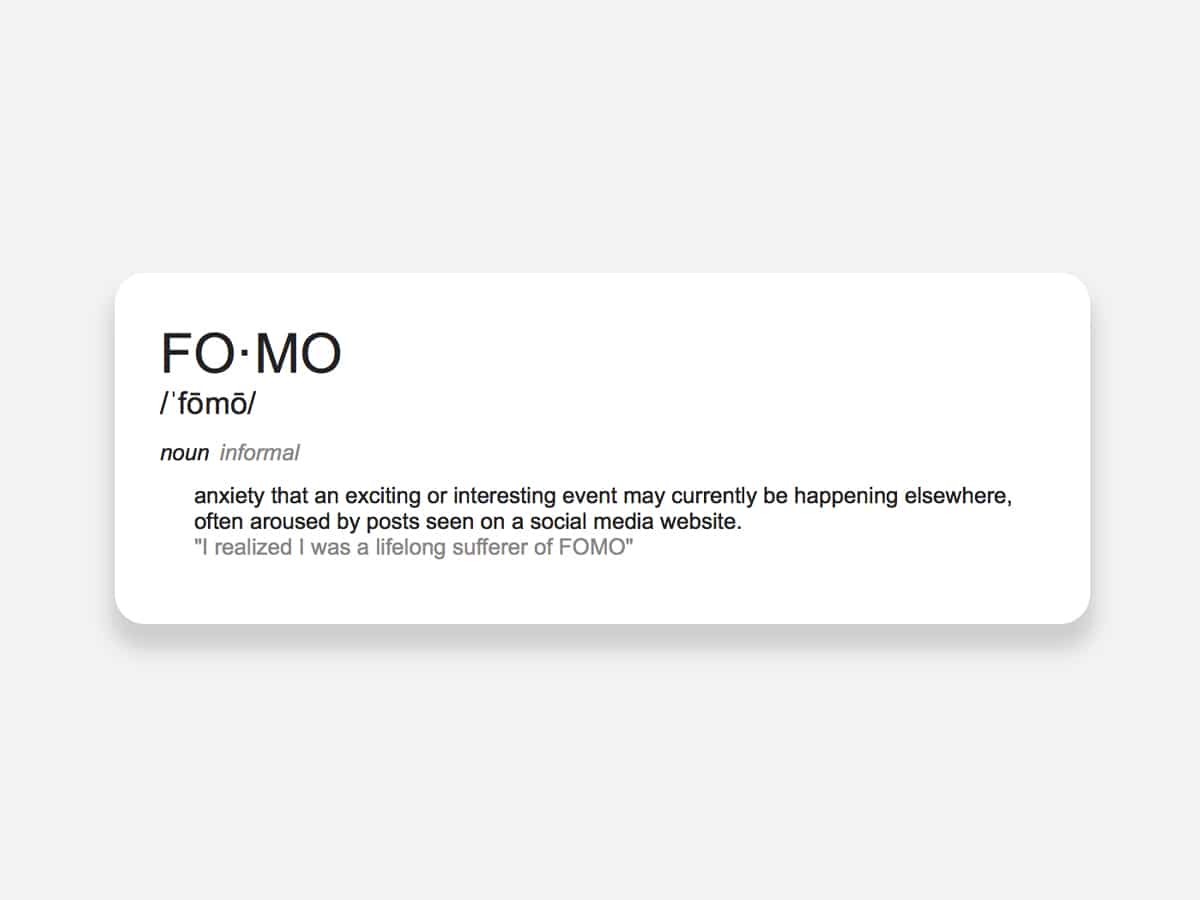
Published:
Readtime: 5 min
Every product is carefully selected by our editors and experts. If you buy from a link, we may earn a commission. Learn more. For more information on how we test products, click here.
FOMO; We’ve all had it at some point, more so as we spend our lives on social media. What used to be termed ‘the grass is always greener’ is now the ‘fear of missing out’, where we say ‘yes’ and stay connected because if we don’t, we’ll miss out on something important.
It’s the two-pronged curse of always being plugged in, added to the Oxford Dictionary in 2013. On the one hand, we see our mates buying flash cars, putting deposits on homes, getting into relationships… and it turns up the dial on comparisonitis – the compulsion to compare our own accomplishments to other people’s to determine how ‘well’ we’re doing in life. On the other hand, we see friends out and about at festivals or work conferences, or discussing topics unknown to us, and it makes us wish we were a part of the ‘in crowd’, even if we’re dead-tired and our social batteries are drained.
If you’re constantly checking your phone or saying ‘yes’ to outings you’d rather actually avoid, you could be experiencing the fear of missing out.

Why Do We Experience FOMO?
As humans, we have an innate desire to connect with others. It helps to regulate our nervous system and bring a greater sense of meaning to our lives.
These days, we do it digitally. By being connected to our mates via our phones, we can stem the fear of missing out. But what we see on our phones could be our friends hanging out or sharing knowledge IRL – which brings it back. See the paradox? By trying to stop the fear of missing out, we actually feed it.
FOMO comes from discontent with our own lives, especially our connection with others. When we are unable to relate with others, we can feel like we’re missing out, which – in-turn – can make us feel low.
The opposite of a regulated nervous system is one that’s on edge (think: ‘fight or flight’), causing us to lose sleep, eat unhealthily, and have a fear of missing out on what other people are (apparently) experiencing. This can lead to poor performance at work, burnout, feelings of sadness or depression, fatigue and headaches, and difficulty concentrating on tasks in the present.

How to Overcome FOMO
When we say yes to something that drains us of our time or doesn’t align with our values, we can increase feelings of anxiety and unhealthy coping behaviours driven by exhaustion or discomfort. For instance, if we value alone time but get FOMO when the work crew heads to the pub across from the office, we might find ourselves sinking a few pints and wearing out our social battery. This might be okay the first time, though friction caused by doing something that doesn’t fit with our highest values can hurt more and more over time, and eventually, this outside trigger impacts our mental health.
To avoid this, the first step is to look inward and focus on what drives you. Once you identify your values, you can eliminate all the rest that do not serve you. For instance, you may value a minimalist aesthetic but feel FOMO when you see your mates snapping up the latest Nike x Off White hiking boots. They don’t align with your values and so they do not serve you. By knowing your ‘why’ (your values), you can more easily accept this and move on.
Similarly, knowing your triggers and curating your social feed to eliminate them can help. I’m not going to tell you to get off social media altogether – we live in a digital world – but you can mute or delete the social profiles you recognise as amplifying your feelings of FOMO. For instance, you may like following your friend from high school but his constant posting about his upcoming engagement is triggering for you because you’d like a relationship of your own. Mute him and remove the trigger altogether. Your social feed should include only profiles that add value and make you feel good when you see them. Happily, this will also help your algorithm as you engage with content that healthily feeds you.
Next, start working on your self-esteem, your opinion of yourself and not what others think of you. When you love yourself, you’re less impacted by what others think/feel/have. Learn how to do this using the exercises in my new book, Paperback Therapy: Therapist-approved tools for mastering your mental health.
Finally, focus on the present. This is easier said than done, but can help you to be happier with where you are right now instead of focusing on what you may not have or where you may not (yet) be. Whenever you feel your mind wandering to the ‘what if?’ of the future, turn back toward now and eliminate that (frankly, sometimes anxiety-inducing) question altogether.
So, the next time you’re invited out when you want to stay in, or get a little worried you’re falling behind when yet another mate gets a promotion, ask yourself with curiosity why it is you’re feeling that way. Is it actually important to you to be out and social / get that promotion / across the latest Traylor drama, or is it just something you feel you should do? If it’s the latter, take the pressure off (yourself), relax, and embrace JOMO instead – the ‘joy of missing out’.





























Comments
We love hearing from you. or to leave a comment.